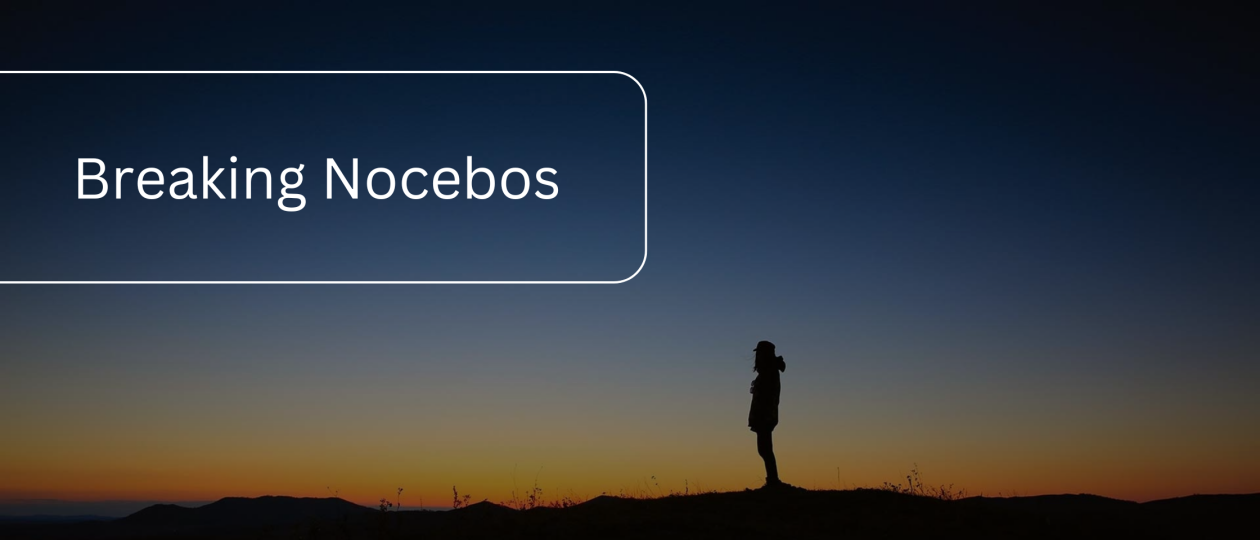Breaking Nocebos
How much of our lives are wasted on lies?
A person’s perspective on themselves and their lives can change nearly everything about their daily life, for better or worse. Believe that you are secure, loved, capable, and have plenty of great opportunities for accomplishing worthwhile things, and I might not say that they’ll BECOME true, but they were likely truer than you realized in the first place. And believing in them gives us access to all that they offer. When we cheat ourselves out of those things by believing something negative and untrue, it’s a prime example of nocebo belief—the inverse of a placebo.
You might be surprised at how powerfully this can work, too. I remember hearing about a med school phenomenon from some friends of mine: whatever you’re studying that week, that’s what your symptoms are. They would literally manifest physical symptoms of a disease they didn’t have, simply by dwelling on them (and perhaps worrying about them). From what I hear, this happens to about 80% of med students, so it’s not a niche thing.
The research on wrong beliefs is not encouraging either. To put a few of the facts briefly (you’ve likely heard them before if you’re a regular reader): approximately 50% of human memories contain errors. Human beings lean about 80% to the negative, meaning negatively biased errors and interpretations as opposed to positive. By contrast, children need about a 10 to 1 ration of positive to negative interactions for emotional health, while adults need around 5 to 1 (though 10 to 1 is even better). What we actually get is more commonly around 10 to 1 negatives.
You can easily see how these pieces fit together, and the picture they create isn’t pretty. It appears that the great majority of us believe we are much worse off than we are, and by believing it, manifest its symptoms. This is especially nasty, because, of course, having those symptoms will only seem to confirm your negative beliefs, leading to a vicious circle.
So how do we get out? Awareness is a great weapon, of course. We tend to automatically treat negative views as being more “discerning” or “realistic,” while positive ones are subjected to ruthless analysis, or simply written off. Realizing that this makes no sense can be a good step, and re-examining some of your beliefs about your life from there. But there’s one tool that I’ve found to be more powerful than any other in treating this issue. It is not the first time I’ve mentioned it here on the blog, but it bears revisiting, because most people probably will not try it after reading about it only once. And I’ve had a number of people who actually did commit to the process absolutely rave about it, telling me how it turned everything in their lives around, and even asking why it wasn’t mentioned in every health text on the planet!
This miracle formula is extremely simple, though difficult at first: every time a negative thought crosses your mind (and I do mean every time), turn it into a prayer. If you don’t believe in God, you can make a request to your heart, think of it as speaking to your subconscious mind, if it helps you, but prayer works best, in my experience. Don’t dress it up, either. Say whatever you feel. Cuss and rant, if that’s where you’re at. If an all-knowing God exists, it isn’t as though you’ll shock Him.
This process will probably be really annoying, and may take up some real mental bandwidth for a while. But in my experience, after about a month—thirty to forty days—your subconscious mind waves the white flag and gets with the program. From there, you might be astonished at how you feel, and all that is available to you.
Have a blessed, wonderful day!
Dr. Alex Loyd




Add a Comment